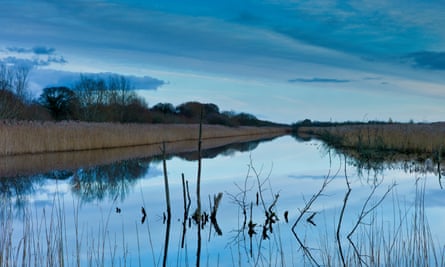The experiences of being Black in the British countryside that Enid Blyton and Brambly Hedge fail to acknowledge.
I
The story began with Brambly Hedge and the beautiful illustrations of Mrs Apple’s kitchen in Crabapple Cottage. Her shelves were overflowing with homemade jams, woven baskets filled with currants and rosehips, and drying herbs hanging from wooden beams. I was only four or five years old when I first read Jill Barklem’s books, but I already knew I wanted to sit at Mrs Apple’s table and try her freshly baked bread and blackberry puddings. I yearned to be like young Wilfred, going on adventures and gathering golden lichen from the blackthorn, or like Primrose, picking wildflowers and visiting the harvest mice in the cornfield.
Later on, I became even more envious when The Famous Five and Children of Green Knowe were added to the mix. I couldn’t understand why those children were allowed to run freely while I was confined by city streets and cars. Growing up in suburban Catford, my only exposure to nature was playing on the swings at the nearby park or going on summer trips with my mother to visit the gardens at the Horniman Museum. I believe my mother also had a love for plants and wildlife, having grown up in the Jamaican countryside, but like many Caribbean Londoners in the 80s, she had learned to not be as outdoorsy and settled for growing a few flowers and vegetables in our small backyard.
As I aged, my desire for a peaceful countryside also waned. While the idea of living in the rural area still appealed to me, the reality of it seemed inconceivable. My childhood fantasies of a simple and pure life became tainted with the harsh realities that are unavoidable and unpleasant. I couldn’t help but be influenced by what I read in books. Fay Weldon’s Puffball warned me about the strong animosity towards newcomers, especially those from the city, held by country residents. Stella Gibbons’ Cold Comfort Farm also depicted the poverty and uncivilized behavior in rural areas. David Mitchell’s Black Swan Green showed me the issues of delinquency, poverty, and limited opportunities in the countryside. Similarly, authors like AS Byatt, Jane Austen, Charlotte Brontë, and Thomas Hardy revealed the complexities of the prevalent class divide in rural areas. David Dabydeen’s Disappearance exposed the pervasive post-imperialist attitudes towards individuals with non-European backgrounds and explained how being a Black person in the English countryside is challenging. As I thought about my identity, I realized how fragile it was becoming. In multicultural London, I didn’t have to explain who I was, but in the unfamiliar rural setting, would I be treated as an Englishwoman or an unwelcome immigrant?
It was when I fell in love with my now husband that I began to see the possibility of living in the countryside. He grew up in a small village near Taunton in Somerset and, as I visited his friends and family, I realized that the countryside was not as unwelcoming as I had thought. I was pleasantly surprised by the kindness I encountered. However, it was difficult to let go of my deep-seated fears, so it took me several years to make the move to the West Country. Our journey involved travelling through different places, starting with a slow cruise on a narrowboat along the Kennet and Avon Canal from Reading to Newbury, then to Devizes, and finally to Bradford-upon-Avon and Bath. Living on a boat turned out to be a helpful preparation for rural life. Being surrounded by water without any modern distractions like TV or shops gave me a sense of freedom and allowed me to appreciate the vast skies and open space. It was a pleasure to live in harmony with the colors and sounds of nature.
However, along with it, despite my efforts to overlook it, also came a troubling feeling of being disconnected and separated from city life. This environment, which I had long desired, was drastically different from the one I was raised in. Suddenly, I had to go without basic things that I had always assumed would be available – such as Afro hair salons and products, the presence of family, the companionship of other Black individuals, and the ability to purchase plantains, breadfruit, and all-purpose seasoning on the main street.

It could have been simple to end our journey there. After all, wasn’t this adventure fulfilling enough? However, with the addition of a child, our desire for stability and a garden became all-consuming. We sold the boat and before we knew it, we were the surprised owners of a damp, attached cottage on the Somerset Levels. I had many concerns to worry about – isolation, discrimination, and feeling lost and alone in the middle of nowhere. But the initial anxiety was soothed by the picturesque landscape. It was like stepping into a real-life Brambly Hedge, complete with the seasonal hedgerows I had always dreamed of as a child.
Unfortunately, life is often challenging. When I first arrived, my mother’s sudden passing left me heartbroken and severed my ties to London.
As I am now in the countryside, I can assess if it meets my childhood ideals. The carefree, wild children of Blyton’s stories are absent, replaced by my own kids who are approaching their teenage years and are not much different from their city-dwelling relatives, often engrossed in technology. However, similar to the books, they have a grandmother who enjoys knitting and baking, and a grandfather who takes them on horse and cart rides on sunny days. I am pleased to say that they have developed a keen knowledge of a diverse range of birds, plants, and animals.
Ignore the newsletter advertisement.
after newsletter promotion
I have grown to love my new home, but there is one aspect that I am still adjusting to. Despite what I read in books, I was not prepared for the loss of anonymity as a Black woman in a predominantly white area. I can no longer walk around unnoticed; I stand out constantly. As a writer and observer of people, I am used to feeling comfortable in a crowd, but here I have had to adapt to being constantly watched. I no longer feel like a Londoner, and my old neighborhood has changed so much since I was a child. However, this feeling of being disconnected has pushed me to assert my right to feel at home wherever I am, despite any opposing views. This is a skill that I hope to instill in my children. Currently, I am living in the West Country, which has sparked a passion in me to write new stories celebrating the changing rural population of England.
Fiona Williams’ novel, The House of Broken Bricks, is available from Faber for £14.99. You can support the Guardian and the Observer by purchasing a copy at guardianbookshop.com, though delivery fees may apply.
Source: theguardian.com

